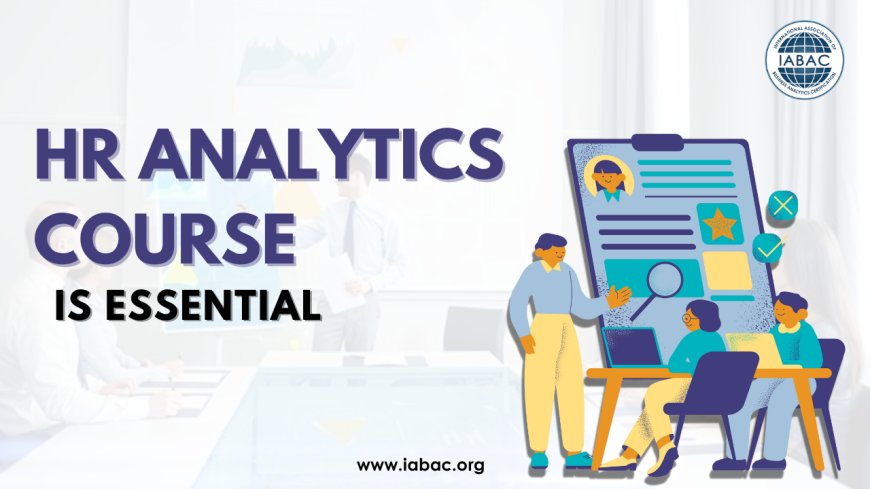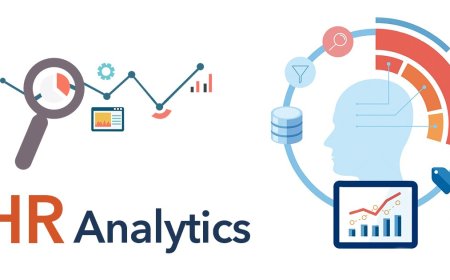Why an HR Analytics Course is Essential
Explore why an HR Analytics course is crucial for modern businesses. Discover its benefits and impact on organizational performance.

HR analytics is changing how we handle human resources. It helps companies make better decisions by using data about their employees. For example, it can help find the best job candidates, predict how well employees will do, and improve their overall satisfaction. This use of data makes HR work smarter and more effective, aligning it with the company’s goals and needs. In short, HR analytics turns employee information into useful actions, making HR a key part of a company's success.
A course in HR analytics is crucial for anyone looking to grow in the HR field. These courses teach you how to understand and use data to help your company succeed. With skills in HR analytics, you can improve your job performance and open up more career opportunities. As companies look more to data to guide their HR choices, knowing HR analytics becomes increasingly important. Learning HR analytics is a step toward being ready for the future and positively impacting your workplace.
Understanding HR Analytics
What is HR Analytics?
HR analytics is about using data to help make better decisions in human resources (HR). It looks at information about employees, like who does well at work or what makes people happy in their jobs. This helps companies understand how to improve things like hiring and keeping employees.
Why is Data Important in HR?
Data is important in HR because it helps make decisions based on facts instead of just guesses. For example, data can show which hiring methods bring in the best new employees or what keeps workers satisfied and productive. Using data helps companies make smarter choices that benefit both the business and its employees.
How is HR Analytics Used?
1. Recruitment: HR analytics helps find the best ways to hire new employees and predict who will do well in a job. This makes the hiring process faster and more effective.
2. Employee Engagement: By looking at data from surveys and feedback, HR analytics helps understand what makes employees happy and motivated. This can lead to better work environments and longer employee retention.
3. Performance Management: HR analytics tracks how employees are doing in their jobs over time. It helps identify top performers and those who may need extra help or training. This ensures everyone is contributing to the company's success.
Benefits of HR Analytics
HR analytics helps companies hire the right people, keep employees satisfied, monitor performance, save money, plan for the future, make informed decisions, and provide effective training. This creates a better workplace for everyone. HR analytics helps companies and employees in many simple ways:
1. Easier Hiring: It helps find the best candidates faster by showing which hiring methods work best. This makes the process of finding new employees smoother and more efficient.
2. Keeping Employees Happy: It helps understand what makes employees stay or leave. Knowing this helps companies create a work environment that keeps people happy and reduces the number of people leaving the job.
3. Checking Performance: It tracks how well employees are doing their jobs. This helps recognize those who are doing great and need a reward and those who might need some extra support or training.
4. Boosting Motivation: It looks at what motivates and satisfies employees by analyzing their feedback and surveys. This helps companies make the workplace more enjoyable and productive.
5. Saving Money: It helps find ways to hire and keep employees that cost less. For example, by reducing how often employees leave, companies save on hiring and training costs.
6. Planning Ahead: It helps companies see what their future workforce needs will be. This
means they can plan for how many employees they'll need and what skills those employees should have.
7. Making Smart Decisions: Data provides clear facts. Using these facts helps companies make better decisions rather than just guessing, leading to more reliable and effective results.
8. Better Training: It identifies where employees might need more skills or knowledge. This helps create training programs that focus on exactly what employees need to improve and grow in their careers.
Why Taking an HR Analytics Course is Essential?
Taking an HR analytics course helps you develop important skills, stand out to employers, advance in your career, and stay current with new developments in HR. It’s a smart move for anyone looking to grow and succeed in the HR field.
1. Skill Development: An HR analytics course teaches you important skills like data analysis, understanding statistics, and using HR technology. These skills are crucial because they help you understand and use data to make better decisions in HR.
2. Competitive Edge: With specialized knowledge in HR analytics, you stand out in the job market. Employers are looking for people who can analyze data and provide insights that improve HR practices. Having these skills can give you an advantage over others.
3. Career Advancement: Learning HR analytics can open up new opportunities for promotions and higher salaries. Companies value employees who can use data to solve problems and improve performance, making you a valuable asset for higher-level positions.
4. Staying Updated: The field of HR is constantly evolving with new trends and technologies. An HR analytics course keeps you up-to-date with the latest tools and practices. This helps you stay relevant and effective in your role, ensuring that you can adapt to changes in the industry.
What to Look for in an HR Analytics Course?
Choosing the right HR analytics course is crucial for your learning and career growth. Here’s what to consider to find a course that fits your needs and goals:
1. Key Topics to Learn:
-
Data Visualization: The course should teach you how to create clear and engaging charts and graphs. This skill is important for presenting data in a way that others can easily understand.
-
Predictive Analytics: Look for courses that show you how to use data to predict future outcomes, like employee turnover or hiring needs. This helps in planning and making informed decisions.
-
HR Metrics: Make sure the course covers essential HR measurements, such as employee performance and satisfaction. Understanding these metrics helps you track and improve HR functions.
-
Data Collection and Cleaning: It’s important to learn how to gather and prepare data for analysis. Good courses will teach you how to collect accurate data and clean it for use.
-
Basic Statistics: Knowing some fundamental statistics helps you make sense of the data. Courses should cover basic statistical concepts to help you analyze HR data effectively.
2. Practical, Hands-On Learning
-
Real-World Projects: Courses with practical projects let you apply what you learn to real situations. Look for those that involve working with actual HR data or creating reports based on real-life scenarios.
-
Case Studies: Courses that include case studies give you a glimpse into how companies use HR analytics in practice. This helps you understand how to apply data analytics in your job.
3. Credibility and Recognition
-
Industry Accreditation: Check if the course is recognized by reputable HR or educational organizations. Accreditation ensures the course meets high standards and is respected in the industry.
-
Certification: Find out if the course offers a certification upon completion. A recognized certificate can be a valuable addition to your resume, showing potential employers that you have verified skills.
4. Flexibility for Your Schedule
-
Online Availability: Consider courses that you can take online. Online courses allow you to study from anywhere, making it easier to fit learning into your busy life.
-
Part-Time Study: If you’re working or have other commitments, look for part-time courses. They let you learn at a pace that fits your schedule.
-
Flexible Scheduling: Choose courses that offer various class times or self-paced learning. This flexibility helps you manage your studies alongside your other responsibilities.
To sum up, the right HR analytics course should cover important topics like data visualization and HR metrics, offer practical experience through projects and case studies, be accredited and recognized in the industry, and provide flexible learning options. This way, you’ll gain valuable skills that can boost your career in HR analytics.
HR analytics is crucial for making better decisions in hiring, managing employees, and improving workplace satisfaction. It uses data to understand and solve HR challenges effectively. Learning HR analytics equips you with valuable skills in data analysis and decision-making that can enhance your career prospects. To stay ahead in the HR field, consider exploring HR analytics courses. These courses can help you gain the knowledge and tools you need to succeed and make a positive impact in your organization. Take the next step and start your journey into HR analytics today.











































